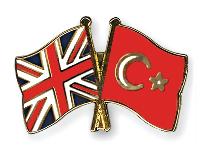Back translation doesn't lead to original wording Thread poster: Gül Kaya
|
|---|
Gül Kaya 
United Kingdom
Local time: 05:42
Turkish to English
+ ...
I'm translating a magazine article into English in which the translated quotations of an English speaker feature quite prominently. The problem is that I have found the original quotations in English and the writer of the article has tweaked and embellished them a little bit. The meaning hasn't changed but a back translation doesn't lead to the original quotation. I'm wondering whether to just translate whatever is written as it is or just use the original quotations which are widely available a... See more I'm translating a magazine article into English in which the translated quotations of an English speaker feature quite prominently. The problem is that I have found the original quotations in English and the writer of the article has tweaked and embellished them a little bit. The meaning hasn't changed but a back translation doesn't lead to the original quotation. I'm wondering whether to just translate whatever is written as it is or just use the original quotations which are widely available and have been repeated in other publications. This isn't a legal document or anything and I was told it didn't need to be highly polished as they just wanted it for information purposes (not publication). Is this a case for translator's notes? ▲ Collapse
| | | | Edward Vreeburg 
Netherlands
Local time: 06:42
Member (2008)
English to Dutch
+ ...
| talk to your client... | Jul 30, 2013 |
see what they want...
...it's that simple.
Back translation does not generally lead to the exact same language anyway,...., there is always some influence of saying things diifferntly, or in your case making somebody say something he did not exactly say perhaps...
| | | | | Back translation will never lead to the original wording | Jul 30, 2013 |
unless you are translating a list of medical terms, some kind of a catalogue. Just make the client aware of that. However, I think you should use the original quotations, absolutely, if you have the original text.
[Edited at 2013-07-30 14:14 GMT]
| | | | | The whole point of back translation | Jul 30, 2013 |
is to see if the content has been translated correctly. So copying the available source will not help the client.
BT, however, is a dubious checking technique at the best of times, and can lead to a whole range of problems.
| | |
|
|
|
Mark Cole 
Local time: 05:42
Polish to English
+ ...
| Try paraphrasing | Jul 30, 2013 |
First of all I would mention it to the client and see what they want the translation for. If it is to check how the speaker's words were translated, they will probably want a back-translation.
If this doesn't get you anywherre and it's just a general article for information, though, you could try paraphrasing what was said to strike some kind of balance between the inaccurate SL article and the original quotes.
| | | | Balasubramaniam L. 
India
Local time: 10:12
Member (2006)
English to Hindi
+ ...
SITE LOCALIZER | Either way would be fine according to me | Jul 30, 2013 |
As you say that the back translation, though embellished a bit, is essentially the same as the original quote as far as meaning is concerned, and that the client is not really after a "polished" translation and wants the translation only for informational purposes, I would suppose that it would be fine either way.
But it would be better if you confirmed this with your client.
| | | | Gül Kaya 
United Kingdom
Local time: 05:42
Turkish to English
+ ...
TOPIC STARTER
Thanks for the comments. The reason I asked is because the client wasn't overly concerned since it is not for publication but just for information as I said. And also it's not to check the competency of the writer (not translator in this case since this is a published article). I wanted to know the correct way to deal with this issue if it arose again in a more legally binding context. I guess in that situation I would translate and then clarify with translator's notes.
@Spencer Allman. I ... See more Thanks for the comments. The reason I asked is because the client wasn't overly concerned since it is not for publication but just for information as I said. And also it's not to check the competency of the writer (not translator in this case since this is a published article). I wanted to know the correct way to deal with this issue if it arose again in a more legally binding context. I guess in that situation I would translate and then clarify with translator's notes.
@Spencer Allman. I also think back translation is a very flawed system of checking accuracy. 10 translators will lead to 10 different versions. ▲ Collapse
| | | | Phil Hand 
China
Local time: 12:42
Chinese to English
| Purpose is everything | Jul 30, 2013 |
As the others above have said.
If the translation was for publication, then you would have to use the original quotes - otherwise you'd be making the author guilty of misquoting her sources.
In this case, as they've specifically told you it's for information, you have to make sure that any differences between the original quotes and the translated quotes is clear. You don't have to write the notes yourself - the client is perfectly capable of reading through and spotti... See more As the others above have said.
If the translation was for publication, then you would have to use the original quotes - otherwise you'd be making the author guilty of misquoting her sources.
In this case, as they've specifically told you it's for information, you have to make sure that any differences between the original quotes and the translated quotes is clear. You don't have to write the notes yourself - the client is perfectly capable of reading through and spotting the differences. But you should make sure that all differences are properly reflected in the back-translation. ▲ Collapse
| | |
|
|
|
Edward Vreeburg wrote:
see what they want...
...it's that simple.
Yes.
And this also really is something a client can decide on on the basis of what he wants or needs, rather than some kind of translation ethics issue.
This said, I'd really avoid back translation of quotations from people as long as possible.
Back translation does not generally lead to the exact same language anyway,...., there is always some influence of saying things diifferntly, or in your case making somebody say something he did not exactly say perhaps...
Yeah. Some equivalents are really one-way streets. If the default translation of A is B, the default translation of B may be C rather than A when going in the opposite direction.
| | | | B D Finch 
France
Local time: 06:42
French to English
+ ...
| Provide both | Jul 30, 2013 |
I'd go for a belt and braces approach. If your client wants back-translation, then provide it, but also provide the original English text of the quotations. Explain in a translator's note that differences between the two English versions are not necessarily a sign of poor translation into the other language.
I think that, when dealing with quoted speech there is (or should be) an ethical duty of care to the person being quoted and to any end reader. The purpose your translation is i... See more I'd go for a belt and braces approach. If your client wants back-translation, then provide it, but also provide the original English text of the quotations. Explain in a translator's note that differences between the two English versions are not necessarily a sign of poor translation into the other language.
I think that, when dealing with quoted speech there is (or should be) an ethical duty of care to the person being quoted and to any end reader. The purpose your translation is intended for now may not be the only use to which it is put in the future. Also the person currently representing the Client is not necessarily the person in their organisation who will eventually use the text.
[Edited at 2013-07-30 16:12 GMT] ▲ Collapse
| | | | James McVay 
United States
Local time: 00:42
Russian to English
+ ...
| A personal experience | Jul 30, 2013 |
B D Finch wrote:
I'd go for a belt and braces approach. If your client wants back-translation, then provide it, but also provide the original English text of the quotations. Explain in a translator's note that differences between the two English versions are not necessarily a sign of poor translation into the other language.
I think that, when dealing with quoted speech there is (or should be) an ethical duty of care to the person being quoted and to any end reader. The purpose your translation is intended for now may not be the only use to which it is put in the future. Also the person currently representing the Client is not necessarily the person in their organisation who will eventually use the text.
[Edited at 2013-07-30 16:12 GMT]
I agree completely. I recently had a similar experience with an op-ed article I was translating for publication. My practice is always to search for the original of quotes from English-language sources. i only provide back translations when i can't locate the original, and then I omit the quotation marks.
In this instance, the author had quoted (in Russian) rather extensively and inaccurately from an English-language source which he didn't cite but i found, thoroughly distorting the meaning of the original, both adding and deleting words and even whole phrases. He evidently did so to strengthen his argument. I queried my client, saying that I would either provide a back translation without using quotes, or I would exactly copy the original English text and put it in quotes -- his choice. I knew from previous exchanges that the customer did not want footnotes that would make the author look bad. The client told me to quote the original text, and I did.
I reasoned that if I provided it as a back translation (a paraphrase) it would be clear to the reader that the author was likely inserting his own opinion. Also, in this day and age, an interested reader could no doubt locate the original just as easily as I did.
| | | | Don Hank 
United States
Local time: 00:42
German to English
+ ...
| Back translation no substitute for a good editor | Jul 30, 2013 |
I always politely turn down back translation simply because I am loathe to let the client waste his money on something so foolish. If I had commissioned a translation and wanted to see if it was accurate, I would hire an editor to go through and critique it. Back translation could never provide the information that an editor could. For example, if the translator saw the word 'contrôle' in a medical context where it was referring to a medical checkup, and mistranslated it as 'control' instead of... See more I always politely turn down back translation simply because I am loathe to let the client waste his money on something so foolish. If I had commissioned a translation and wanted to see if it was accurate, I would hire an editor to go through and critique it. Back translation could never provide the information that an editor could. For example, if the translator saw the word 'contrôle' in a medical context where it was referring to a medical checkup, and mistranslated it as 'control' instead of checkup, the back translator would also use the word 'contrôle' in the French because that FR word has both meanings. The client would never know that word was mistranslated. On the other hand, if the client had a good editor/translator, that person would be able to make the correction.
Beware of back translation! It is fraught with hazards. ▲ Collapse
| | |
|
|
|
James McVay 
United States
Local time: 00:42
Russian to English
+ ...
| With respect, you misunderstood | Jul 30, 2013 |
Don Hank wrote:
I always politely turn down back translation simply because I am loathe to let the client waste his money on something so foolish. If I had commissioned a translation and wanted to see if it was accurate, I would hire an editor to go through and critique it. Back translation could never provide the information that an editor could. For example, if the translator saw the word 'contrôle' in a medical context where it was referring to a medical checkup, and mistranslated it as 'control' instead of checkup, the back translator would also use the word 'contrôle' in the French because that FR word has both meanings. The client would never know that word was mistranslated. On the other hand, if the client had a good editor/translator, that person would be able to make the correction.
Beware of back translation! It is fraught with hazards.
This isn't about back translation for QC purposes. It's about how to deal with poorly translated quotes in an article that were originally in another language. You can't just ignore them.
| | | | LEXpert 
United States
Local time: 23:42
Member (2008)
Croatian to English
+ ...
Spencer Allman wrote:
BT, however, is a dubious checking technique at the best of times, and can lead to a whole range of problems.
I recall one set of two backtranslations from two different forward translations of the same document. One particular EN word in the original source text had multiple possible definitions (but only one correct one for the context). One forward translator got it right. The other forward translator picked the wrong dictionary definition.
Yet the backtranslation would be exactly the same in both cases!
| | | | | A slightly different angle | Jul 31, 2013 |
I am sometimes asked to translate speeches, and on one occasion was given a speech to be held at a wedding by the father of the bride.
He quoted the famous passage from the Bible in 1 Corinthians 13.
I could see he had chosen a modern translation to quote in Danish - probably because that was what he had close to hand.
But he asked for 'the REAL bible, the King James Version' in English.
I grew up with the King James version, and love it, but it dates from 1... See more I am sometimes asked to translate speeches, and on one occasion was given a speech to be held at a wedding by the father of the bride.
He quoted the famous passage from the Bible in 1 Corinthians 13.
I could see he had chosen a modern translation to quote in Danish - probably because that was what he had close to hand.
But he asked for 'the REAL bible, the King James Version' in English.
I grew up with the King James version, and love it, but it dates from 1611 and this passage is particularly difficult for modern readers, especially if English is not their native language, as would be the case with some of the wedding guests:
Charity suffereth long, and is kind; charity envieth not; charity vaunteth not itself, is not puffed up,
5 Doth not behave itself unseemly, seeketh not her own, is not easily provoked, thinketh no evil;
6 Rejoiceth not in iniquity, but rejoiceth in the truth;
7 Beareth all things, believeth all things, hopeth all things, endureth all things
So I found the passage as asked, but gave him two alternative versions - as far as I remember, one was from the New King James Version:
4 Love suffers long and is kind; love does not envy; love does not parade itself, is not puffed up;
5 does not behave rudely, does not seek its own, is not provoked, thinks no evil;
6 does not rejoice in iniquity, but rejoices in the truth;
7 bears all things, believes all things, hopes all things, endures all things.
Others prefer ' Love is patient' rather than 'suffers long' as a modern translation - the word has changed from meaning something like tolerate or allow in the modern sense, to a sense that does not fit so well in context.
There are dozens of versions in English, and thousands in other languages, all of which are more or less precise renderings of what Paul actually wrote (or dictated). ______________________
When generalising, the target language, the date of the original passage, and lots of other factors may make an original quote more or less useful.
It all depends how the original is understood by the reader - with reservations for the situation Rudolf Vedo describes, shifts in meaning, false friends in the reader's own language, not reading the whole passage, or taking it out of context... and all the other pitfalls.
I think the only correct thing to do is to provide the original quotation where available - and let readers interpret it for themselves. Some will misunderstand, but at least they have the chance of understanding correctly.
And this, without pointing any accusing finger, may also reveal whether the person quoting the text has misunderstood or it stretching the meaning.
It is impossible to guard entirely against taking passages out of context.
Sometimes, as with the quotation from the 1611 translation of the Bible or any older text, a paraphrase or annotation may be necessary to make it understandable to the specific target group. Highly specialised technical language or jargon may need explanation.
Back translation can never stand alone as QA, but if one is aware of the pitfalls and BT is combined with other forms of QA, then it can be useful.
In short, each case has to be considered individually. ▲ Collapse
| | | | To report site rules violations or get help, contact a site moderator: You can also contact site staff by submitting a support request » Back translation doesn't lead to original wording | Trados Studio 2022 Freelance | The leading translation software used by over 270,000 translators.
Designed with your feedback in mind, Trados Studio 2022 delivers an unrivalled, powerful desktop
and cloud solution, empowering you to work in the most efficient and cost-effective way.
More info » |
| | Protemos translation business management system | Create your account in minutes, and start working! 3-month trial for agencies, and free for freelancers!
The system lets you keep client/vendor database, with contacts and rates, manage projects and assign jobs to vendors, issue invoices, track payments, store and manage project files, generate business reports on turnover profit per client/manager etc.
More info » |
|
| | | | X Sign in to your ProZ.com account... | | | | | |














